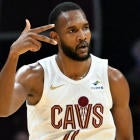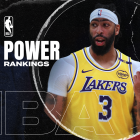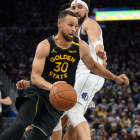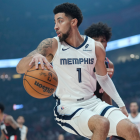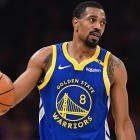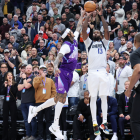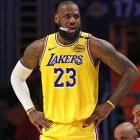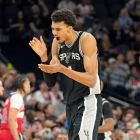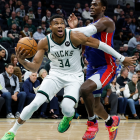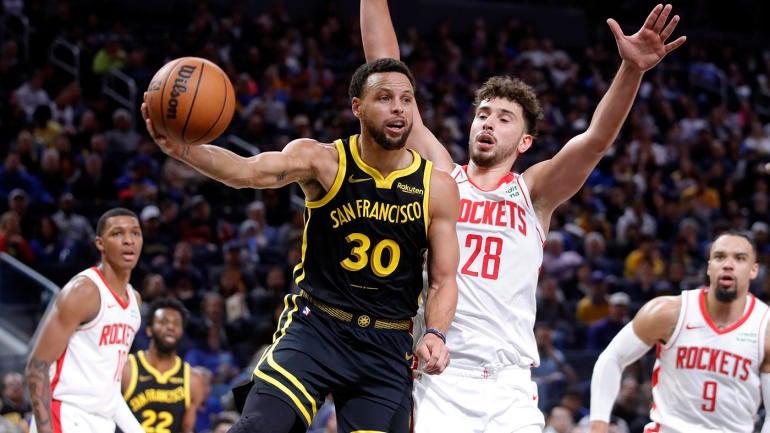
On March 1, the Houston Rockets were 25-34 and seven games out of the No. 10 seed in the Western Conference. They were so far away from postseason basketball that they didn't even hold the No. 11 seed at that point. But in the past four weeks, they've not only managed to leapfrog the Utah Jazz in 11th, but have come within striking distance of the play-in itself.
So here we sit on March 27. The 36-35 Rockets, winners of 11 of their past 12 games, now trail the 37-34 Golden State Warriors by only a single game in the standings. That is a game they will be able to make up directly on April 4, when they host the Warriors in one of the final games either team will play this regular season. All of this brings us to the question of the day: will Houston successfully complete one of the more epic comebacks we've seen in years? Or will they fall short of the four-time champions? Here are three reasons why they might catch up and three reasons why they're still likely to fall short.
Pro: Jalen Green is lighting the NBA on fire
Nikola Jokic is the presumptive 2024 MVP. In March he shares a scoring average with Jalen Green. The two of them are both putting up 27.8 points per game this month, and these aren't empty numbers, either. Green is just a hair below 50% from the field and he's above 40% from deep. These aren't empty points, either. They represent self-driven scoring that is carrying Houston's offense. Green has made 51 isolation field goals this season, according to Synergy Sports. Nearly 40% of them (19 out of 51) have come in March alone. The Rockets are trusting him to create his own offense, and it's paying off.
To some extent, this feels natural. Green is a No. 2 overall pick in his third season that has never actually been handed the keys to an offense before. He had to share a back-court with Kevin Porter Jr. in his first two seasons, a clunky partnership based on Houston's false presumption that the shoot-first Porter could become a traditional point guard. That failed. Houston brought in Fred VanVleet this season and then proceeded to run their offense through ascending big man Alperen Sengun. With Sengun out, Green is on an ascent that his draft position suggested was coming. He just needed the opportunity.
Con: His shooting doesn't seem sustainable
All of that said... Green's shooting from just about every area of the court is significantly outpacing his career and even season numbers. Green isn't even a 34% pull-up 3-point shooter for the season. In March? Not only is he making 40.6% of those attempts, but only Damian Lillard and Luka Doncic are making more of them per game. The mid-range numbers tell a similar tale. Through the end of February, he was making 38.1% of them. That's more or less in line with his career numbers. In March, he's at 45.2%.
It's reasonable to think that Green is getting better as he ages towards his prime. Jumps like that scream "random hot streak within a small sample." The truth is likely somewhere in between. But shooting like that affects everything else Green does offensively. Defenses become so desperate to prevent the jumper that his driving lanes look clearer and higher-value passes open up. Green is a nuclear athlete. If he can pair that with consistent jump shooting over a sustainable period, he'll be an All-Star. One month just isn't a sustainable period. He still has a ways to go to prove this shooting is legitimate.
Pro: Things are worse for the Warriors than they appear
The Warriors are 10-8 since the All-Star break. Not bad, right? Well, let's look at those wins. Half of them came against lottery teams. Two of them came against the Lakers. LeBron James missed the first game. Anthony Davis played only 12 minutes in the second, and the Lakers won those minutes by six points. The three remaining wins came against the Bucks without Khris Middleton, the Heat without Jimmy Butler and Tyler Herro and the Knicks without Julius Randle, Mitchell Robinson and OG Anunoby. The Warriors aren't playing especially well right now. They're just fattening up on weak opponents.
Con: But both schedules greatly favor Golden State
So... speaking of fattening up on weak opponents... here are Houston's 11 March wins: at Suns, Spurs, at Blazers, at Kings, at Spurs, Wizards, Cavaliers, at Wizards, Bulls, Jazz, Blazers. The only one of those teams that holds a top-six seed right now is Cleveland, and the Cavaliers didn't have Evan Mobley in that game. It's not exactly a murderer's row of opponents. This tends to happen in March. Teams at the top and bottom of the standings become much more cautious with injuries because their fates are already sealed. That can lead to some wild outcomes, this Houston streak included.
But the rest of the way? The Rockets aren't going to be able to rely on easy opponents, but the Warriors sure can. Golden State has the fifth-easiest schedule remaining in the NBA by opponent's winning percentage. Houston has the fifth-hardest. Throw in Golden State's existing head-to-head tiebreaker and the hardest part hasn't even begun for the Rockets yet.
Pro: Alperen Sengun may be able to return after all
When Alperen Sengun went down on March 10, the fear was that he'd suffered a significant, long-term injury. Everyone involved breathed a sigh of relief when it turned out that he'd suffered a Grade 3 ankle sprain. That was expected to keep him out for the season, but it wasn't the sort of injury that would linger into next season. All-in-all, it felt like a best-case scenario.
But now, the prognosis could potentially be even brighter. ESPN's Tim MacMahon said on the Hoop Collective Podcast Monday that Sengun returning this regular season is "within the realm of possibility." Sengun was Houston's best player when healthy. He made a real bid at both an All-Star berth and the Most Improved Player award. Getting him back on the floor at all, even compromised, would give Houston access to talent it does not otherwise have.
Con: Alperen Sengun may be able to return after all
Of course, Houston's playing style has changed drastically since Sengun went down. They jumped from 14th in pace for the season to fifth in the games they've played since his injury. Jock Landale has played well in Sengun's stead, but in a much lower-maintenance role. The Rockets have largely abandoned the traditional backup center, and rookie Amen Thompson, nominally a guard, has often functioned as a center offensively. His shooting makes it hard for him to play as a traditional wing, but the Rockets have weaponized him as an athlete near the rim and on lobs. That's much harder to do with Sengun in the game.
Thompson and Sengun are both core Rockets. Green obviously is as well. Eventually, they're going to have to find a way to coexist. There are blueprints for them out there. The Nikola Jokic-Jamal-Murray trio in Denver is an example for them to emulate, though there are defenses. Green and Sengun can stylistically play similarly to the way that Tyrese Maxey and Joel Embiid do. Mixing an ultra fast guard with an ultra smart center creates all sorts of opportunities once that pair has developed enough chemistry.
But we're not here to discuss Houston's long-term future. We're here to talk about the short term. Introducing a high-usage offensive hub into the mix right now threatens to throw off the balance of what the Rockets have achieved without him. Sengun is essential to Houston's long-term hopes. Right now, nobody in the league seems to know how to deal with the version of the team they've been putting out without him. Their best hopes at making the playoffs may lie in leaving things exactly as they've been recently, even if that doesn't include arguably their best player.
Looking for more NBA coverage? John Gonzalez, Bill Reiter, Ashley Nicole Moss and special guests dive deep into the league's biggest storylines daily on the Beyond the Arc podcast.









